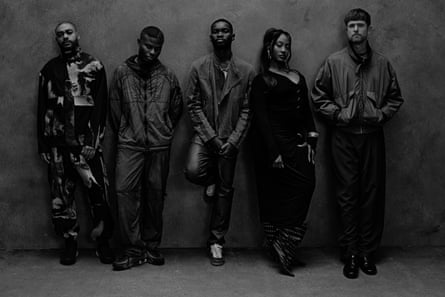Exploring Dave’s Musical Journey in “The Boy Who Played the Harp”
In his latest album, Dave reflects on a two-year hiatus from the music scene, stating that he has been noticeably absent for “two summers.” This new release, titled *The Boy Who Played the Harp*, comes four years after his previous solo project, the critically acclaimed and platinum-selling *We’re All Alone in This Together*. Notably, it has been two years since he collaborated with Central Cee on the EP *Split Decision*, which produced “Sprinter.” This track not only became a historic UK rap number one but also achieved notable success in the US market, selling over a million copies and even making it onto Barack Obama’s annual playlist. instead of leveraging this newfound fame like central Cee—who collaborated with major artists such as J cole and Ice Spice—Dave chose to step back from music entirely.
A Thoughtful Return
This decision may seem perplexing at first glance. Though, listeners will find insights into his absence within *The Boy Who Played the Harp*. The album opens with an ominous organ sound accompanied by verses that initially appear to celebrate his success and wealth—he describes living in a home with “a garden as vast as Eden” and “a forest.” Yet this portrayal serves as a clever misdirection both musically and lyrically.
The Soundscape of Reflection
*the Boy who Played the Harp* is characterized by its understated sound—a blend of minimalistic arrangements featuring delicate piano melodies and subtle nuances. Tracks like “175 Months,” which opens with unsettling beats and ethereal vocal samples,set an introspective tone. Even more upbeat tracks such as “No Weapons,” produced by Jim Legxacy (who also worked on “Sprinter”), feel restrained rather than exuberant. Once we move past the initial verses of “History,” it becomes clear that much of Dave’s recent experience revolves around grappling with existential dilemmas rather than self-promotion. At one point he questions himself: “Why don’t you share photos or release new music? Why not create something instead of just worrying?”

The Struggles of Adulthood
Many themes explored throughout this album resonate universally; they reflect common anxieties faced during one’s late twenties—a transitional phase where individuals confront their adult identities whether they feel ready or not. in tracks like “Selfish,” Dave wrestles with thoughts about settling down: “You could have kids… don’t you feel behind?” He engages in an extended dialogue on “Chapter 16” alongside Kano—a veteran figure in UK rap whose career began when Dave was still young—discussing everything from sudden fame to personal relationships. Kano shares how he traded luxury cars for family life, emphasizing different values.

A Quest for Meaningful Impact
Dive deeper into his lyrics reveals another layer; he’s visibly torn about whether his work carries enough social consciousness or impact at all. On tracks like “My Twenty-seventh Birthday,” he questions if anyone truly wants to hear him rap: “We don’t need commentators; let’s focus on enjoying music instead.” Ironically though, through self-reflection within these songs lies evidence that contradicts these doubts about relevance.
A Masterclass in Storytelling
An album filled with introspection from a triumphant artist might seem tedious at first glance; however, Dave proves himself to be an exceptional lyricist capable of transforming personal struggles into compelling narratives without veering into self-indulgence. His technical prowess enhances this muted soundscape while drawing attention to both his voice and lyrical flow.
Pushing Boundaries Through Narrative
This is especially evident when he shifts focus outwardly on tracks like “Marvellous” and “Fairchild.” These songs showcase his storytelling ability vividly—the former narrates a young man’s descent into violence stemming from trauma while the latter addresses sexual assault through multiple perspectives before erupting into powerful commentary encompassing issues such as misogyny within hip-hop culture: “I’m complicit; no better than you.” It’s raw yet captivating material that underscores why any doubts regarding Dave’s artistry are unfounded.